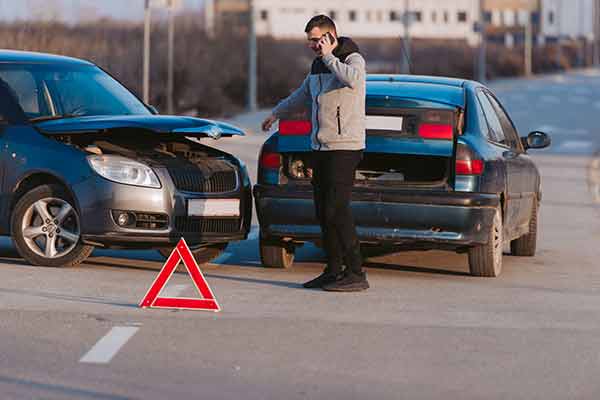Table of Content
- What happens if the person at fault in an accident has no insurance in Florida?
- What Should You Do If You Were in an Accident and the At-Fault Driver Doesn’t Have Insurance?
- How Do You Make an Insurance Claim for a Car Accident Where the At-Fault Driver Has No Insurance?
- What If the Other Driver Caused the Crash But You Don’t Have Insurance?
- What If You Caused the Accident and Don’t Have Insurance?
- What to Do Next If You Don’t Have Insurance After a Car Accident in Florida
- Can You Still Defend Yourself If You Don’t Have Insurance?
- How a Florida Car Accident Lawyer Can Help When Insurance Is Missing
Getting into a car accident without insurance in Florida can turn your life upside down, especially when you’re not sure who’s responsible for the costs. What happens if you have no insurance but the other driver was at fault? Or if they’re the one without coverage? We’ll break down what really happens in these situations, what rights you still have, and how to protect yourself from financial and legal trouble.
What happens if the person at fault in an accident has no insurance in Florida?
Getting into an accident is bad enough-but finding out the driver who hit you doesn’t carry insurance can turn your situation into a nightmare. Unfortunately, it happens a lot more often than people expect.
In 2023, more than one in seven drivers nationwide (15.4%) were uninsured, according to the Uninsured and Underinsured Motorists: 2017–2023 report by the Insurance Research Council. Florida consistently ranks among the top states for uninsured drivers, and the latest figures from 2023 show that one in five drivers in the state is uninsured. That’s why having your own insurance policy isn’t just about following the law—it’s about protecting your future in the case of an accident. But what if the other driver hits you and doesn’t have insurance coverage?
Your First Line of Compensation: PIP Insurance
Florida is a no-fault state, which means your own Personal Injury Protection (PIP) coverage kicks in first, no matter who caused the accident. Every Florida driver is required to carry at least $10,000 in PIP, but this policy only goes so far. If your injuries aren’t classified as an emergency medical condition, you might only have $2,500 available. PIP can also help with a portion of lost wages if your injuries keep you from working, but it won’t cover pain and suffering, vehicle repairs, or long-term treatment. And if your medical bills climb over $10,000, which happens fast after a hospital visit, you’ll need another source of help.
Your Options When the Other Driver Can’t Pay
If the at-fault driver has no insurance and no assets to seize, your ability to recover money from them directly is extremely limited. Suing someone without any income, savings, or property often results in a hollow victory—you may win in court, but never see a dollar. That’s why in most cases, you’ll be left with three possible paths:
1. Use Your Own UM Coverage (If You Have It)
This is your best-case scenario. Uninsured/Underinsured Motorist (UM/UIM) coverage is optional in Florida but strongly recommended, especially with the state of uninsured drivers on the road. If you purchased it, UM coverage steps in when the at-fault driver has no insurance or not enough of it.
Moreover, it covers what PIP doesn’t—hospital bills, rehab, long-term care, lost wages, and even pain and suffering. UM also protects you in hit-and-run situations, which are treated the same as being hit by an uninsured driver under Florida law.
There are 2 main UM coverage types:
- If you choose stacked UM coverage, your protection is even stronger. Stacked coverage lets you combine the limits of UM policies across multiple vehicles on your policy. For example, if you have $100,000 in UM on two vehicles, stacking gives you up to $200,000 in coverage per accident. It also follows you even if you’re in someone else’s car or hit as a pedestrian.
- Non-stacked coverage is more limited and only applies to the specific vehicle listed. The cost difference is often minimal, but the protection stacked coverage offers in a serious accident can be life-changing.
But to use it, you have to act fast and follow the steps carefully. But what other coverage options might be available if you don’t have UM coverage?
2. Supplement with MedPay (If Available)
Medical Payments (MedPay) coverage is another optional policy that can help cover expenses that PIP misses. It’s usually not enough to handle serious injuries, but it can soften the financial blow in the early days after an accident, especially if you don’t have health insurance or need co-pays covered.
Our advice is to use it early, as it can help cover co-pays, deductibles, ambulance fees, and out-of-pocket expenses not handled by PIP. MedPay kicks in regardless of who caused the crash and can cover you, your passengers, or even you as a pedestrian or cyclist. In Florida, where the average hospital stay after a car accident can exceed $50,000, even a few thousand in MedPay can make a difference. Just be aware: MedPay doesn’t cover lost wages or long-term rehab—it’s built for short-term relief.
4. Use Your Collision Coverage (If You Have It)
If your car was damaged in the crash, collision coverage can help pay for repairs or even replace your vehicle, regardless of who was at fault. While it’s not required in Florida, many drivers choose to carry it for exactly this reason. Neither PIP nor UM covers vehicle damage, so if the at-fault driver has no insurance and you don’t have collision coverage, you could be left paying for repairs out of pocket. Collision coverage does come with a deductible, but it can save you thousands after a serious crash.
Seek Third-Party Liability (When Possible)
In some cases, a third party may share responsibility for the accident. If the uninsured driver was working at the time—delivering packages, driving a company car, or transporting passengers—their employer may be held liable under Florida law. The same applies in cases involving rideshare vehicles, borrowed cars, or defective vehicles. These cases are more complex and fact-specific, but they could open up a source of compensation when the at-fault driver has none.
These coverage options can make all the difference when the other driver can’t pay, but having the right policy is only half the battle. What you do immediately after the crash matters just as much.
What Should You Do If You Were in an Accident and the At-Fault Driver Doesn’t Have Insurance?
If you’ve been hit by a driver with no insurance, what you do in the first few hours and days matters just as much as who caused the crash.
- First, call 911 and make sure a police report is filed, even if the other driver begs you not to. A police report is the foundation of your claim and may be the only official proof that the other driver was at fault and uninsured.
- While you’re at the scene, take photos of the vehicles, the damage, skid marks, and anything else that helps paint the full picture of what happened. If there are witnesses nearby, get their names and contact info because this kind of evidence can be critical later.
- Next, get medical attention immediately. Don’t wait, even if you feel okay. Some injuries take hours or days to show up. More importantly, your PIP coverage only kicks in if you seek treatment quickly. Without documented injuries, your insurance company may try to deny the claim altogether.
- Then, contact your insurer to report the accident and ask about your UM coverage. Let them know the other driver didn’t have insurance. This step opens the door for you to file a UM claim if it’s available. Let’s break down what the UM claims process looks like.
How Do You Make an Insurance Claim for a Car Accident Where the At-Fault Driver Has No Insurance?
If you were hit by a driver who doesn’t have insurance, you’ll need to file a Uninsured Motorist (UM) claim with your own insurance company. But it’s not as simple as just making a phone call. First, gather all your documentation: the crash report, your medical records, any witness statements, photos of the scene, and proof that the at-fault driver lacks insurance. Your insurer will ask for this to verify the claim. If the other driver fled the scene, you’ll need to report it as a hit-and-run, which is also covered under UM in Florida, as long as physical contact occurred.
Once you’ve submitted everything, your insurer will launch an investigation to confirm the other driver’s lack of coverage and assess your damages. You’ll likely be asked to give a recorded statement and may be required to attend an independent medical exam (IME). Be cautious here, as these exams are often biased in favor of the insurer. Don’t sign anything or accept a settlement too quickly. Once you accept, you can’t go back for more.
You also need to notify your insurer as soon as possible. Your policies have strict notice requirements that kick in right after the crash. And while you’re juggling medical bills, time off work, and recovery, your insurance company might quietly work to minimize or deny your claim. That’s why getting a lawyer involved early isn’t just helpful—it could be the difference between getting covered and getting left with the bill. They can step in, handle communications, push back on unfair treatment, and ensure your claim is taken seriously. In cases where the insurer refuses to act fairly, your lawyer can also prepare a bad faith claim, which may entitle you to damages above and beyond your original policy limits.
The process takes time, but the more organized and proactive you are, the better your chances of getting the full compensation you deserve.
Next, consider a no-insurance car crash where you don’t have coverage, but the other driver was at fault. Is everything still that straightforward?
What If the Other Driver Caused the Crash But You Don’t Have Insurance?
First, remember that even if the other driver is 100% at fault, not having insurance in Florida puts you at serious risk, both legally and financially. Florida law requires every vehicle owner to carry at least $10,000 in PIP and $10,000 in Property Damage Liability (PDL). If you’re uninsured at the time of the crash, you’re automatically in violation, regardless of who caused the accident. You could lose your license, have your registration suspended, and be forced to pay reinstatement fees and carry costly SR-22 insurance just to drive again. That makes carrying your coverage essential. But what happens if you don’t have it?
Your Legal Options If You’re Uninsured
You can still file a claim or lawsuit against the at-fault driver, but let’s be honest, it won’t be easy. Insurers and courts may view you as reckless for not carrying coverage, even though the crash wasn’t your fault. If the at-fault driver is insured and you suffered serious injuries, you may be able to file a third-party liability claim against their policy. But without your own PIP policy, you won’t have the benefit of immediate coverage to pay for medical care or lost income in the meantime.
You Could Be Blamed and Pay the Price
Moreover, under Florida’s modified comparative fault system, the other side might try to blame you for part of the accident. If you’re found more than 50% at fault, you lose your right to collect any compensation. And even if you’re less than 50% at fault, your payout gets reduced by your percentage of blame. If you don’t have insurance and were also speeding, texting, or failing to maintain your car, you’ve handed them ammunition to use against you.
When you don’t have insurance, the entire process becomes more hostile. Insurance companies treat uninsured drivers as high-risk, and they’ll often use any excuse to avoid paying full compensation. You may still have a case, but you’ll need to fight harder to prove it. That’s why speaking with a car accident attorney as early as possible can give you a better shot at protecting your rights, recovering your losses, and staying out of deeper legal trouble.
What If You Caused the Accident and Don’t Have Insurance?
That is the worst-case scenario. Without PIP coverage to protect you and no liability insurance to shield your finances, you’ll be left facing the full weight of the damages alone. As we’ve mentioned, in Florida, driving without insurance is illegal, and causing an accident on top of that opens the door to lawsuits, license suspension, and out-of-pocket liability.
The other driver can file a claim directly against you, and if their injuries meet Florida’s “serious injury threshold,” they can sue you for everything from medical bills and lost wages to pain and suffering. If the injured party wins in court, they can get a judgment against you and start collecting it through wage garnishment, liens, or seizing non-exempt property. In simple words, your house, wages, savings, and even future income can be on the line.
And the consequences don’t stop there. Samely, the Florida Department of Highway Safety and Motor Vehicles (FLHSMV) will likely suspend your license and registration until you provide proof of insurance and pay a reinstatement fee. You’ll also be required to carry SR-22 insurance, which comes with high premiums for at least three years.
What to Do Next If You Don’t Have Insurance After a Car Accident in Florida
What you do in the hours and days after the accident can protect your rights or make things worse.
- Don’t Leave the Scene. No matter what, stay at the scene and call 911. Leaving—even if you didn’t cause the crash—can turn a traffic violation into a criminal hit-and-run charge. Florida law requires you to exchange information and report the accident if there are injuries or property damage over $500, which covers most crashes.
- Say Less, Document More. When law enforcement arrives, stick to the facts. Don’t admit fault, and don’t volunteer that you don’t have insurance unless asked directly. Take photos, get contact info for witnesses, and document anything that shows the other driver caused the crash.
- Get Medical Care Immediately. Even without PIP coverage, get checked by a doctor right away. Delaying care could hurt your health and your claim. Medical records will be key if you try to recover damages from the other driver’s insurance or if someone files a claim against you.
- Understand What Happens Next. Once the dust settles, you’ll likely get a notice from the Florida Department of Highway Safety and Motor Vehicles (FLHSMV) saying your license and registration are being suspended for driving without insurance, as we’ve already mentioned.
Can You Still Defend Yourself If You Don’t Have Insurance?
If the other driver was at fault, you can still pursue a third-party insurance claim through at-fault driver coverage if they have it. But insurers may try to use your lack of insurance against you, delay the claim, or push you to settle for less. That’s why you should never talk to the other driver’s insurance adjuster alone. An attorney can help you build your case, prove fault, and protect your right to compensation, even if you broke the law by driving uninsured.
If you are at fault and without insurance, you could be facing a lawsuit, wage garnishment, or even a court judgment that impacts your finances for years. Without liability insurance, you’re personally responsible for the other driver’s damages. That’s why contacting a lawyer right away is critical in this case, too. A skilled attorney may be able to reduce your liability, challenge the details of the crash, or negotiate a lower settlement amount to avoid financial ruin.
How a Florida Car Accident Lawyer Can Help When Insurance Is Missing
Whether you were hit by an uninsured driver or you were driving without insurance yourself, one thing is clear: the road ahead is complicated. And you shouldn’t walk it alone. At Steinger, Greene & Feiner, our car accident lawyers know how to step in fast, protect your rights, and fight for every dollar you’re entitled to.
If the at-fault driver doesn’t have insurance, we’ll help you file a strong Uninsured Motorist (UM) claim, push back against lowball offers, and hold your insurance company accountable if they act in bad faith. We can also dig deeper to identify other responsible parties who may share liability and provide another source of compensation.
If you don’t have insurance, the stakes are even higher. We’ll work to reduce your financial exposure, defend you from aggressive claims, and negotiate with the other side to prevent a judgment that could follow you for years.
We serve clients across Florida with offices conveniently located in West Palm Beach, Miami, Fort Lauderdale, Tampa, Fort Myers, Orlando, Port St. Lucie, and many more cities throughout the state. In every case, we’ll handle the paperwork, the phone calls, the insurers, and the legal system—so you can focus on healing. No judgment. No pressure. Just real help, when and where you need it.





